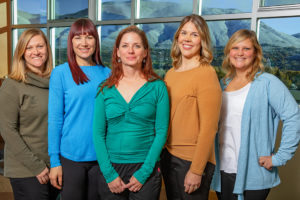Sports Medicine
AVH Traumatic Brain Injury Program Provides Healing and Hope
As an avid skier and mountain biker, Michael Hayes had suffered his share of concussions. So at first he wasn’t surprised when, after a skiing accident in February 2018, he began to experience symptoms such as disorientation and irritability. Images taken in the Emergency Department at Aspen Valley Hospital (AVH) soon after the accident hadn’t revealed any bleeding in Michael’s brain, and he was instructed to go home, rest and return to normal activity slowly. After more than a week, however, his symptoms were still debilitating.
“When I’d had concussions before, I had always returned to typical activity shortly afterward,” Michael said. “With this one, I wasn’t able to do much of anything. I wanted to sleep all the time, overstimulation put me into a serious pain cave, I was disoriented, and I forgot conversations and entire events. I was a shadow of my former self. It was pretty scary.”
Growing Demand
For years, head injuries such as Michael’s have been a growing concern in the Roaring Fork Valley — especially for pediatric patients, as injuries to a developing brain can have significant, long-standing effects. So in 2010, AVH Occupational Therapist Krista Fox began exploring ways to improve the medical outcomes for these patients. “At the time, many people weren’t getting comprehensive follow-up care for a brain injury,” Fox said. “We just didn’t have a good way to manage them.”
All of that changed when AVH launched its Traumatic Brain Injury Program in 2014, allowing physicians, therapists, trainers and others to access best practices when managing adult and pediatric patients. Since then, the need for these services has only grown, and AVH’s program is one of most progressive and comprehensive brain injury programs on the Western Slope.
[Pictured: Krista Fox, OT, works with a patient at AVH using the state-of-the-art Bioness Integrated Therapy System (BITS) technology. The system is part of the progressive care offered at AVH which assesses the physical, visual, auditory and cognitive abilities of individuals with brain injuries, movement disorders as swell as competitive athletes.]
“Our Emergency Department now sees more than 2,000 visits each year for head injuries, largely activity-related but also caused by car accidents, falls and work injuries,” noted Kimber Kurr, a Physical Therapist with the program, who is also a board-certified pediatric specialist. “Fortunately, physicians and patients are much more aware of our ability to truly make a significant difference in recovery from brain injury.”
In addition to Fox and Kurr, the program’s staff includes Physical Therapists Amy Bumgarner and Ellen Barlow, Occupational Therapist Marissa Meinema and Speech Language Therapist Lizzy Ransbottom.

Highly individualized care
When treating brain injury, an aggressive, personalized approach is associated with improved long-term outcomes, with treatment starting within a few days of the injury. Care begins with a comprehensive assessment to identify the affected systems.
“Brain injury can be incredibly complex,” Bumgarner said. “We have to look at different types of impairments — visual, emotional, cognitive, balance, cervical or neck pain, sleep disturbances, changes in activity tolerance and so on — as well as more traditional focuses of rehab, such as general muscle strength.”
From there, the therapy team creates an individualized program that includes regular visits to the program’s home base at AVH, daily exercises at home and, typically, collaboration among the program’s different therapists, as well as other hospital and community resources.
Length of treatment depends on an array of factors, from the severity of the injury to how well the patient responds to treatment. Many patients recover from mild brain injury in a few weeks, while treatment for severe injury may continue for years.
Michael’s journey continues
With his fiancé’s encouragement, Michael reported his symptoms to his Neurologist, Brooke Allen, MD, who encouraged him to contact the Traumatic Brain Injury Program.
Although his expectations were low — “I just wanted to feel some degree of normalcy” — Michael saw encouraging signs quickly. “From my first appointment until now, it’s been a slow and steady improvement process,” he said.
“I don’t want to sound like I’m proselytizing, but I am: Don’t mess around with a head injury. I feel incredibly fortunate to have the AVH team beside me to provide strong, evidence-based recovery.”
For more information, call AVH’s Traumatic Brain Injury Program at 970.544.1177.


